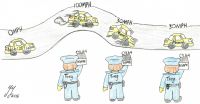(Press-News.org) June 16, 2015 - When natural disasters strike - droughts, typhoons, floods - the media, charities, and science organizations appeal to the public both for aid to the victims and to communicate the causes of these events. Increasingly, as scientists link extreme weather events to climate change, people are mixing the discussion about climate change and aid. But a new study offers caution: Researchers found that linking a natural disaster with climate change caused climate change skeptics to justify the withholding of aid from victims.
When typhoon Haiyan struck in Philippines in 2013, killing more than 6,000 people, Daniel Chapman of the University of Massachusetts, Amherst, was especially interested in the news reports framing the event as the product of human-caused climate change. He and his adviser Brian Lickel started to wonder how "speculation about this connection to a topic as politicized as climate change may influence how people think about the disaster and the victims," Chapman says.
"We are constantly trying to gain a better understanding of the influence of psychological processes in major world events," Chapman explains. "Climate change is a pressing global issue that possesses significant implications for human societies."
So Chapman and Lickel designed a study in which online participants read one of two hypothetical news stories about a famine in Sub-Saharan Africa. Both articles described the disaster but one of them also described possible links between the droughts causing the famine and human-driven climate change; the other article had no mention of climate change. Both articles concluded by highlighting the need for aid relief in the region.
After reading the articles, the researchers surveyed the participants about whether they felt there was a big need to help alleviate the victims' suffering, whether they believed that the victims might be partially at fault for their situation, and several other measures of their perceptions of the disaster. They also asked whether the participants thought they might donate to the relief efforts and then about their political and climate change beliefs.
As published in Social Psychological and Personality Science today, those participants who were highly skeptical of climate change reported greater justifications for not helping the victims when the disaster was attributed to climate change. And Chapman adds that: "In spite of there being a modest correlation between conservatism and skepticism, our results suggest that it is skepticism about climate change in particular, and not conservatism more generally, that drives our observed findings."
Past research has shown that individuals are motivated to construe facts and evidence in ways that align with their preexisting beliefs, for example misconstruing evidence about scientific consensus in the field of climate science. But Chapman and Lickel wanted to see if there was an additional effect, such that linking a real-world event with a politicized topic could also affect individuals' perceptions of this event.
At the same time, they wanted to extend recent research that has highlighted the importance of a disaster's cause in influencing individuals' support for humanitarian relief operations. "Our work highlights that linking humanitarian relief efforts with politicized topics has an important influence on support for humanitarian aid." Outside of this research, he said, the majority of psychological research on charitable giving has not explored these kinds of political dimensions.
To charities and media reaching out to the public after a natural disaster, Chapman offers caution in mixing the discussion of climate change-disaster links with appeals for aid: "Speculation about whether a disaster may or may not be caused by climate change appears to have negative rather than positive effects for some individuals' perceptions of disaster victims and willingness to help."
Chapman points out, too, that this phenomenon likely is not limited to climate change. "It is equally plausible that other politicized issues, such as gun control, nuclear energy, and the use of GMOs, could evoke similar responses in other contexts," he says. Future work will explore some of these links.
"Ideological beliefs shape our reactions to the world around us and mold how we interpret world events, but this is often not a conscious or deliberate process," Chapman says. "We hope that our findings and other related research can help raise individuals' awareness of how their own strongly held beliefs can influence the ways they evaluate scientific information and how they perceive world events."
They ultimately hope that this awareness can help to make individuals resilient against these processes. Says Chapman:"We hope future research will continue to expand the scope of investigation on charitable giving to better understand the multitude of processes affecting individuals' donation decisions."
INFORMATION:
The paper, "Climate Change and Disasters: How Framing Affects Justifications for Giving or Withholding Aid to Disaster Victims," by Daniel A. Chapman and Brian Lickel, was published in Social Psychological and Personality Science online on June 16, 2015.
The journal Social Psychological and Personality Science is a collaboration from the Association for Research in Personality, the European Association of Social Psychology, the Society of Experimental Social Psychology, and the Society for Personality and Social Psychology, and is co-sponsored by the Asian Association of Social Psychology and Society of Australasian Social Psychologists.
As the U.S. Supreme Court prepares to rule on same-sex marriage equality, a University of Cincinnati survey of same-sex couples finds that 90 percent of the respondents felt that the option to marry was important to their relationship. The study is currently published online in the Journal of Homosexuality.
UC researchers Stephen M. Hass, an associate professor of communication, and Sarah W. Whitton, an assistant professor of psychology, uncovered the perceived benefits of cohabitation and marriage of same-sex couples after conducting a national online survey of 526 ...
This news release is available in French. A multidisciplinary group of researchers from British Columbia has developed a participatory action research program to help address healthy body weight in children.
The SCOPE (Sustainable Childhood Obesity Prevention through Community Engagement) program has a simple message and was developed to engage communities to take action to prevent childhood obesity. The first phase of the SCOPE program was funded by Child Health BC, an initiative of BC Children's Hospital, and was carried out in communities in British Columbia. The ...
Just as militaries need to have trained, experienced soldiers ready for future wars, making sure that the immune system has enough battle-ready T cells on hand is important for fast-acting, more effective vaccines, according to Penn State researchers.
In a study of immune response in mice, the researchers found that regulatory T cells -- Tregs -- are critical for the immune system's ability to remember and fight off future pathogen attacks. T cells, which are specialized types of white blood cells, play important roles in the immune system and immunological memory.
"Immunological ...
ALEXANDRIA VA, JUNE 16, 2015 - Dramatic increases in data science education coupled with robust evidence-based data analysis practices could stop the scientific research reproducibility and replication crisis before the issue permanently damages science's credibility, asserts Roger D. Peng in an article in the newly released issue of Significance magazine.
"Much the same way that epidemiologist John Snow helped end a London cholera epidemic by convincing officials to remove the handle of an infected water pump, we have an opportunity to attack the crisis of scientific ...
London, Ontario, June 11 -- Researchers at Lawson Health Research Institute have identified a new stem cell population in the colon linked to cancer growth. The findings, which were recently published in the prominent journal Cell Stem Cell, will significantly change the way we study and treat colon cancer.
Colon cancer is the second leading cause of cancer death in Canada. It is estimated that in 2015 that 25,100 Canadians will be diagnosed with colon cancer representing 13 percent of all new cancer cases.
Dr. Samuel Asfaha, a clinician-scientist at Lawson and an ...
CORVALLIS, Ore. - A new study has found that toxic algal blooms in reservoirs on the Klamath River can travel more than 180 miles downriver in a few days, survive passage through hydroelectric turbines and create unsafe water conditions on lower parts of the river in northern California.
Water-borne algal blooms can accumulate to concentrations that can pose health risks to people, pets and wildlife, and improved monitoring and public health outreach is needed to address this issue, researchers said.
The frequency, duration and magnitude of harmful algal blooms appear ...
This news release is available in French. Montreal, June 16, 2015 -- Thousands of patients die each year in hospitals across North America due to medical errors that could be prevented were doctors and nurses provided with instant access to patient records via wireless technology. Cue the catch-22: the electromagnetic radiation caused by those very devices can interfere with electronic medical equipment and thus lead to serious clinical consequences for patients.
Luckily, that could soon change thanks to new research from Concordia University that helps define a ...
Humans aren't the only ones who like to cruise along the waterways, so do viruses. For the first time, a map of fecal viruses traveling our global waterways has been created using modeling methods to aid in assessing water quality worldwide.
"Many countries are at risk of serious public health hazards due to lack of basic sanitation," said Joan Rose, Homer Nowlin Chair in water research at Michigan State University. "With this map, however, we can assess where viruses are being discharged from untreated sewage and address how disease is being spread. With that, we can ...
Tropical Storm Bill was making landfall at 11 a.m. CDT on Matagorda Island, Texas on June 16 as NASA and NOAA satellites gathered data on the storm. At NASA a movie of Bill's landfall was created using data from NOAA's GOES-East satellite. The center of Bill is expected to move inland over south-central Texas during the afternoon and night of June 16.
On June 15 at 19:15 UTC (3:15 p.m. EDT) the MODIS instrument aboard NASA's Aqua satellite captured a visible image of Tropical Storm Bill approaching Texas and Louisiana. Powerful thunderstorms circled the center in fragmented ...
Results from a new study led the Georgia Institute of Technology's School of Psychology and University of Minnesota's Carlson School of Management show that, compared to younger job seekers, older adults receive fewer job offers, search for weeks longer and are ultimately less likely to find re-employment after losing a job. The study is published by the journal Psychological Bulletin.
"There's very robust evidence that as an individual moves beyond age 50, they experience a large penalty toward how quickly they will find a job," says Professor Connie Wanberg, the Industrial ...


